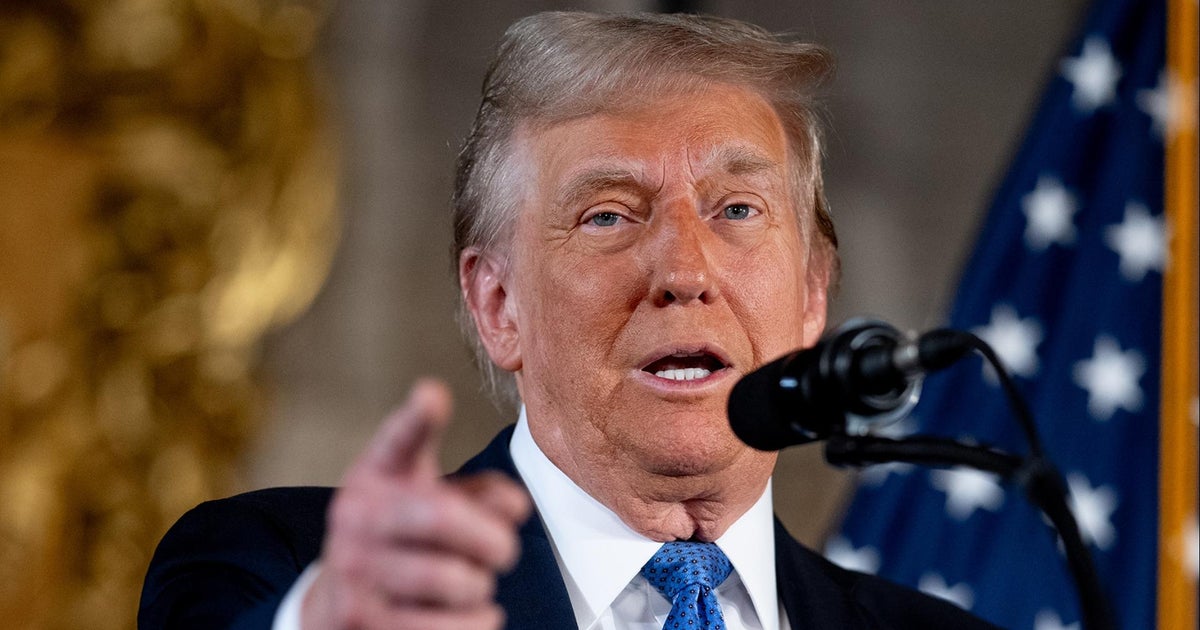CBS News
Democrats in Congress are planning for the next Jan. 6

In a nondescript office a few floors above the cafeteria and a Dunkin’ in the Longworth U.S. House Office Building, Democratic staffers on a low-profile U.S. House committee have been gaming out what they say are some political nightmare scenarios.
They’re discussing the perils of Jan. 6. But not Jan. 6, 2021.
Democrats on the House Committee on Administration, which has oversight of the U.S. Capitol campus and federal election laws, have been meeting and designing a plan against any attempt to interfere with the Electoral College certification on Jan. 6, 2025.
Keeping in mind the memories of the violence and chaos that engulfed Washington on Jan. 6, 2021, and the worsening political fractures that followed, the committee’s Democrats have researched and discussed plans to ensure security is tight, and they’ve begun efforts to debunk emerging conspiracy theories about undocumented migrants voting in federal elections.
One vulnerability is proving particularly difficult to measure: What happens if the U.S. House fails to select a speaker by Jan. 6, 2025? It wasn’t an issue in 2021.
But the uncommon scenario happened just two years ago, amid an internal Republican battle over who should lead the party in the House after the midterm elections.
The standoff paralyzed most of the operations of the House for days. A recurrence after this year’s elections could add a fog of uncertainty and risk to how Congress will certify the winner of the presidential race on Jan. 6, 2025 when it reconvenes to begin the year.
The new Congress will be seated Jan 3, 2025, days before Jan. 6.
“Those are the types of questions we are exploring,” Rep. Joe Morelle, a New York Democrat who serves as ranking member on the House Administration Committee, told CBS News. Morelle said the panel’s Democrats are researching precedent and undertaking tabletop exercises to prepare for efforts by supporters of former President Donald Trump to use such a scenario to overturn election results.
Morelle told CBS News, “I don’t want to get into a lot of specifics because it’s pretty sensitive. And frankly, I don’t want to give people ideas.”
A group of constitutional law experts told CBS News there’s no specific prescription for such a political standoff in the Constitution itself.
“The Constitution assumed a certain level of normality in our politics. But ‘normal’ may not describe our current politics,” said University of Maryland constitutional law professor Mark Graber.
Graber, who authored the 2013 book “A New Introduction to American Constitutionalism,” told CBS News the drafters of the Constitution likely “assumed Congress would get organized and elect its officers,” he said. “What happens if Congress can’t get organized? We really don’t know.”
“I don’t think whether there’s a speaker or not is going to or should upend the (Jan. 6) process,” Paul Berman, a law professor at the George Washington University, told CBS News. “The rules of the House shouldn’t overrun a constitutional mandate.”
“The 12th Amendment of the Constitution requires Congress to certify the vote,” Berman said. But it’s unclear whether a House speaker must be chosen — or formal House rules be approved — for the House to fulfill its responsibility.
Rep. Jamie Raskin, a constitutional law expert who represents Maryland as a Democrat in the House, said the mandate of the Constitution cannot be derailed by House procedures or internal House political impasses. Raskin told CBS News, “The House rules cannot override the constitutional directives. And we just need to make sure that the Constitution is being followed.”
Congress sought to eliminate some of the uncertainty and potential vulnerabilities surrounding the Jan. 6 electoral certification process by passing a law in 2022 to tighten standards and codify some of the rules of the process.
The law reaffirms that the vice president’s role in the process of counting the electoral votes is “ministerial” and that he or she has no power to reject electors or resolve disputes about the electors.
The law also raised the threshold necessary for dissenters in the House and Senate to formally object to the electors submitted by states on Jan. 6. Instead of permitting a single member of each chamber of Congress to object to a state’s electors, one-fifth of the House and Senate must vote to do so.
Sen. Amy Klobuchar, a Minnesota Democrat who chairs the Senate Rules Committee and helped draft the law, told CBS News the Electoral Count Reform Act prevents “the electoral count process from once again being used as a trigger point in an insurrection and to ensure that the votes for President accurately reflect the election results in each state.”
Supporters of the new law, including the Washington, D.C.-based Campaign Legal Center, have argued that the House speaker has no meaningful role in certifying the presidential election, which should insulate the process on Jan. 6, 2025.
But some Democrats told CBS News they fear that any uncertainty can be exploited, and point to a failure to prepare for subterfuge on Jan. 6, 2021.
Some of the dynamics that stalled House action in 2023 are at risk of recurring. Election forecasts and polling indicate the majority in the House could be very narrow again in 2025, after the 2024 elections — the margin was 221-212 at the beginning of the 118th Congress in January 2023. A very slim majority increases the risk of a protracted House speaker leadership battle and standoff.
Raskin said, “There are undoubtedly lots of things that we will want to be prepared for out of an abundance of caution.”
Morelle said the meetings and research are ongoing in his committee’s offices. He told CBS News the panel’s Democrats want “to make sure that none of the challenges we had last time are present and that we’re thinking about eventualities.”
CBS News
Dec 20: CBS News 24/7, 1pm ET

Watch CBS News
Be the first to know
Get browser notifications for breaking news, live events, and exclusive reporting.
CBS News
In recent comments, Trump talks history of U.S. tariffs. Here’s a fact check.

President-elect Donald Trump made claims about the history of U.S. tariff collection as he defended his plan to raise tariffs on goods from countries like China and Mexico in a news conference this week, claims historians say are at odds with the facts.
In particular, Trump exaggerated the impact of tariff hikes during his first term, falsely claiming that “no other president took in 10 cents” of revenue from trade collections on Chinese imports. Trump also pointed to 19th-century tariff increases championed by former President William McKinley as evidence that his plan could benefit the economy.
But data shows the federal government had been taking in billions in revenue from tariffs on Chinese imports long before Trump came to office, and historians say the high tariff era of the 1890s was economically rocky for Americans.
Tariffs are taxes on imports, often charged as a percentage of the price that importers pay foreign sellers. They aren’t paid by foreign nations, but by U.S. companies who often pass the cost to American consumers by raising prices.
In his next term, Trump has pledged to put an additional 10% levy on all Chinese goods, along with a 25% tariff on all products from Mexico and Canada. Americans spend more than $1 trillion on goods from those three countries each year, according to data from the Census Bureau.
What Trump gets wrong about history of tariffs on China
In his news conference this week, Trump repeated a claim he made frequently on the campaign trail: that his predecessors essentially took in no money from tariffs on Chinese goods, while his administration took in billions.
Tariffs on Chinese imports have existed since the 1700s, generating billions in revenue for years before Trump came into office.
During President Barack Obama’s final year in office, tariff revenue from Chinese imports totaled over $12 billion, according to data from the U.S. International Trade Commission. That amount increased after Trump’s first round of tariff hikes to over $22 billion, the same federal data shows.
Trump did dramatically raise the total revenue generated from Chinese imports by adding tariffs on hundreds of billions of dollars’ worth of goods. However, even with that increase, tariff collections have not accounted for much more than 2% of federal revenue at any point in the last 70 years, according to the Congressional Research Service this month.
The president-elect has argued his tariff plan for his next term could bring in revenue to help defray the cost of income tax cuts. Goldman Sachs estimated that Trump’s proposed levies on goods from China, Mexico and Canada could generate just under $300 billion in tariff revenue per year, which would be up from $77 billion in fiscal year 2024.
But tariffs had not been viewed as a primary way to raise revenue since the federal income tax was introduced in 1913, said Judith Goldstein, a political science professor at Stanford.
“As the U.S. became more involved in the world, the effect of tariffs on domestic production and prices were increasingly a problem,” Goldstein said.
Trump has also repeatedly argued his tariff plan will help protect U.S. companies. There’s some evidence that the customs duties he imposed in his first term boosted jobs in specific industries like washing machine manufacturing, according to research from the Brookings Institution, a think tank. However, manufacturers also faced higher costs for raw materials and retaliatory tariffs from other nations, according to the Federal Reserve.
What Trump gets wrong about the McKinley tariffs
This week, Trump also cited McKinley’s 1890 tariff hikes as evidence that these customs taxes can enrich the U.S.
“You go back and look at the 1890s, 1880s, McKinley, and you take a look at tariffs, that was when we were proportionately the richest,” Trump said.
In 1890, tariff hikes raised the average duties on foreign imports from 38% to nearly 50%. McKinley, a representative for Ohio at the time, pushed for the taxes to protect his state’s steelworkers from foreign competition, according to Dartmouth College economics professor Doug Irwin.
However, the decade that followed these hikes was marked by economic trouble.
“The U.S. went into a depression in 1893, and we didn’t really emerge out of it until the mid-1890s. So in general the 1890s was not a great decade for the U.S. economy,” Irwin said.
Additionally, McKinley’s tariff bill raised prices of goods like shoes and clothes, leading to voter backlash that cost Republicans 93 seats in the next election, according to the House of Representatives Office of the Historian.
Trump’s transition team did not respond to a request for clarification on why he said America was “proportionately the richest” after this bill passed.
Historic data shows gross domestic product per capita for Americans has vastly increased from about $6,400 in the early 1890s (in 2017 dollars) to roughly $69,000 today (in 2024 dollars).
“It is unclear why he’s picking on the 1890s as this golden age. It wasn’t considered good times, at least by the people living through it at the time,” Irwin said.
CBS News
How can Congress avoid a government shutdown?

Watch CBS News
Be the first to know
Get browser notifications for breaking news, live events, and exclusive reporting.






